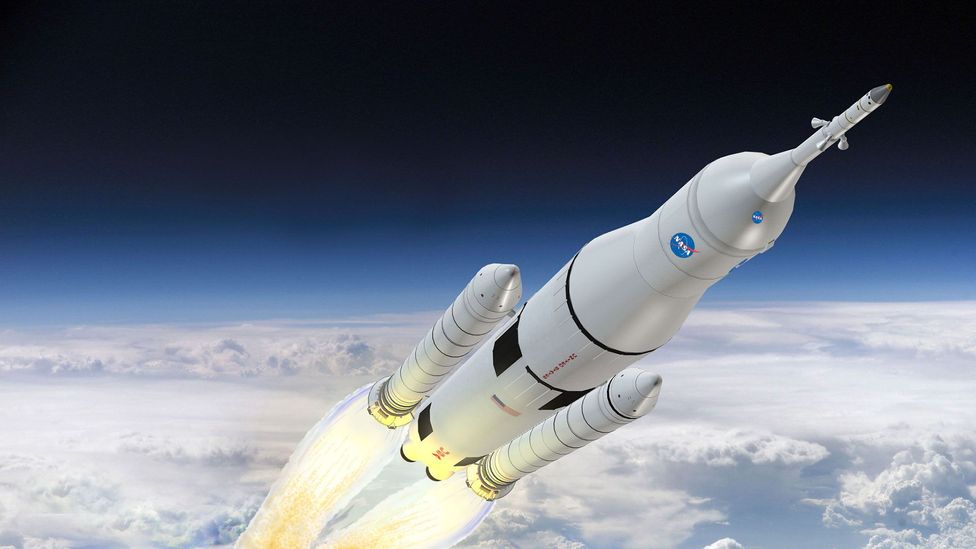What is the fastest realistic space travel?

What was the fastest human space flight
The Space Shuttle has an orbital velocity of around 30,000km/h, but the crew of Apollo 10 hold the official record for the fasted manned vehicle when they reached 39,897km/h relative to the Earth on 26 May 1969 during their return from lunar orbit.
How long does it take to get to space
If you walked at an average speed of 6 km per hour (3.7 mph) it would take you 16 hours and 40 minutes to get to space. NASA's Space Shuttle took about 8.5 minutes to get into Earth orbit, according to NASA.
Can you feel acceleration in space
The astronauts on board the International Space Station are accelerating towards the center of the Earth at 8.7 m/s², but the space station itself also accelerates at that same value of 8.7 m/s², and so there's no relative acceleration and no force that you experience. This same principle works on extreme scales, too.
How fast is the space shuttle traveling km h
approximately 28,000 km/hr
The final orbital speed of the space shuttle is approximately 28,000 km/hr (17,500 mph).
How fast is Jeff Bezos space flight
It reached a height of 351,210 feet (about 66.5 miles) and speeds of more than Mach 3 before floating back down to Earth. "Blue Control, Bezos.
How far is voyager 1
Voyager 1 has reached a distance of 23.381 billion km (14.528 billion mi; 156.29 AU) from Earth and 23.483 billion km (14.592 billion mi; 156.97 AU) from the Sun.
How long is 1 days in space
Another way to measure a day is to count the amount of time it takes for a planet to completely spin around and make one full rotation. This is called a sidereal day. On Earth, a sidereal day is almost exactly 23 hours and 56 minutes.
Is 1 hour in space
No. The time-dilation effect of Einstein's relativity has nothing to do with space. It has to do with speed and gravity. The faster you're moving, or the closer you are to a strong source of gravity, the slower time goes for you.
How fast is 1g in space
At a constant acceleration of 1 g, a rocket could travel the diameter of our galaxy in about 12 years ship time, and about 113,000 years planetary time. If the last half of the trip involves deceleration at 1 g, the trip would take about 24 years.
How long would it take to reach light speed at 1g
From Earth's frame of reference, if you're accelerating at a constant rate of 1 g, then you'd reach near the speed of light in about a year, having covered about 0.5 light-years in distance.
How fast is Voyager 1 traveling
As of 2013, the probe was moving with a relative velocity to the Sun of about 61,197 kilometers per hour (38,026 mph). With the velocity the probe is currently maintaining, Voyager 1 is traveling about 523 million km (325 million mi) per year, or about one light-year per 18,000 years.
How long would it take to get to Alpha Centauri
Alpha Centauri is the nearest star and planetary system to Earth – it is 4.37 light-years away, but it would take a human about 6,000 years to get there with current technology.
How long did Jeff Bezos flight last
approximately 10 minutes
The flight lasted approximately 10 minutes and crossed the Kármán line. The passengers were Jeff Bezos, his brother Mark Bezos, Wally Funk, and Oliver Daemen, after the unnamed auction winner (later revealed to have been Justin Sun) dropped out due to a scheduling conflict.
How long will Bezos space flight last
But Bezos appears ready to risk it all for an 11-minute ride to space. Just how risky is his decision Mission NS-15 lifting off from Launch Site One in West Texas on April 14, 2021.
Will Voyager 1 ever stop
The two Voyager spacecraft could remain in the range of the Deep Space Network through about 2036, depending on how much power the spacecraft still have to transmit a signal back to Earth. Where are Voyager 1 and 2 today
Is Voyager 1 losing speed
The Voyager 1 loses speed gradually after gaining speed from gravity assist.
How long was a day 2000 years ago
In Earth's early history, a day was 23.5 hours and a year lasted 372 days | CNN.
How long is 1 second in space
299 792 458 metres
The light-second is a unit of length useful in astronomy, telecommunications and relativistic physics. It is defined as the distance that light travels in free space in one second, and is equal to exactly 299 792 458 metres (approximately 983 571 055 ft).
Why 1 hour in space is 7 years on Earth
The first planet they land on is close to a supermassive black hole, dubbed Gargantuan, whose gravitational pull causes massive waves on the planet that toss their spacecraft about. Its proximity to the black hole also causes an extreme time dilation, where one hour on the distant planet equals 7 years on Earth.
Is 1 hour in space 7 years on Earth true
The story is that 1 hour on that particular planet is equivalent to 7 years in space. Time dilation is real, but it's completely unrealistic that it would have an effect anywhere near that in any realistic scenario. In practice, it's a tiny fraction of a second, not many years.
How fast is 10G force
2.2 MPH per second
How fast is 10G force G/10 = 3.2 ft/sec/sec = 2.2 MPH per second (3.2*3600/5280=2.2 approximately!) In other words, the speed increases by 2.2 MPH every second.
How much is 7gs of force
"7 G's would be 7x the force of gravity," Stewart said. For perspective, people on earth feel one "G" on a daily basis. Experiencing the force of gravity at that high of a level causes some people to feel nauseous or dizzy, get tunnel vision and ultimately pass out.
Is it possible to go 1% the speed of light
It's possible to get something to 1% the speed of light, but it would just take an enormous amount of energy.
Can we reach 10 speed of light
Nothing can travel faster than 300,000 kilometers per second (186,000 miles per second). Only massless particles, including photons, which make up light, can travel at that speed. It's impossible to accelerate any material object up to the speed of light because it would take an infinite amount of energy to do so.
Will humans ever visit Alpha Centauri
So before even diving into the specifics of the system or its planets, no, humans can not yet go to Alpha Centauri and live there because, simply put, we wouldn't survive the trip. The Alpha Centauri system actually has three stars.



0 Comments